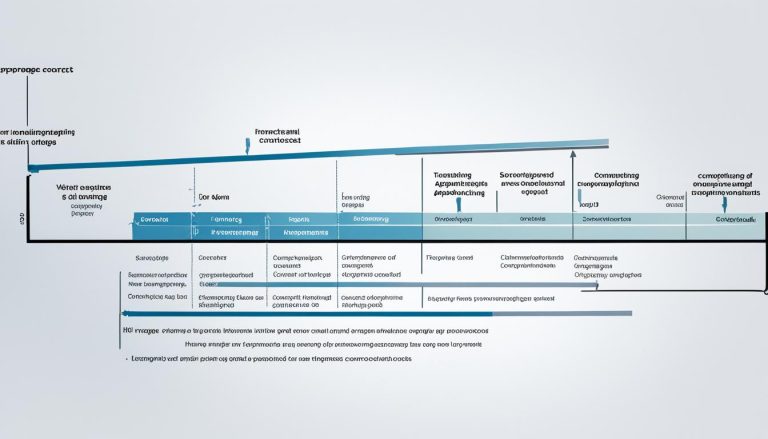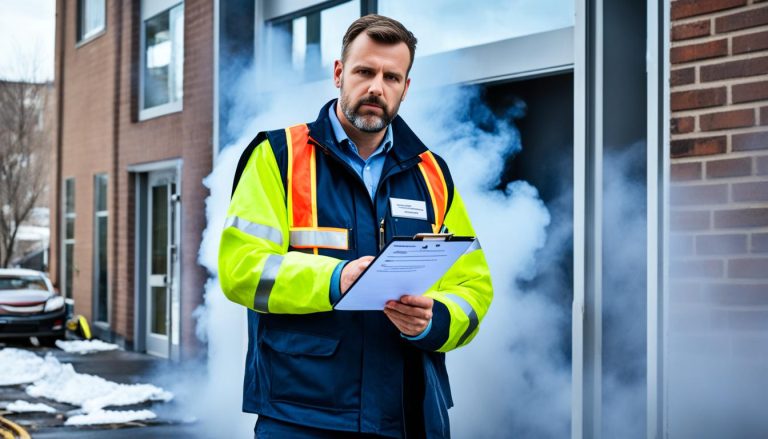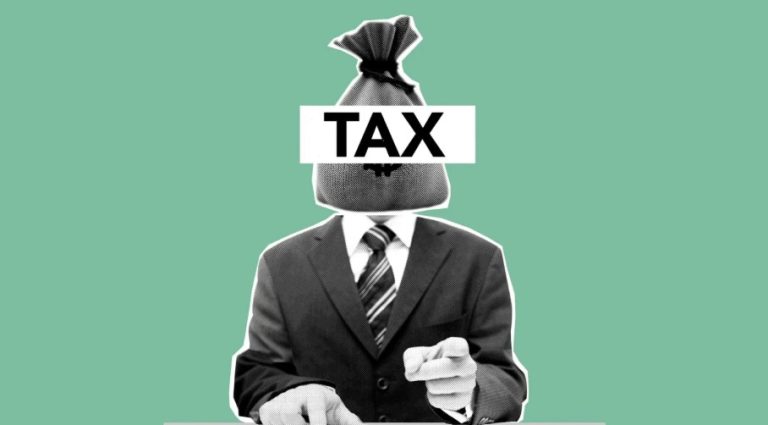Video doorbells have become an essential security tool, with one in five homes in the UK now using them to monitor their property. They allow homeowners to check who is at their door, track deliveries, and enhance overall security.
However, experts are warning that improper use of video doorbells could lead to legal consequences, including fines of up to £100,000. Many homeowners are unaware of the strict privacy and data protection laws that apply to these devices. Max Royston, director at Gaffsy, has highlighted the importance of ensuring compliance with GDPR and CCTV regulations in the UK.
Failing to follow these rules can result in fines from the Information Commissioner’s Office (ICO) and even legal action from affected individuals. Understanding these laws is crucial for avoiding hefty penalties and ensuring that video doorbells are used responsibly.
What Are the UK Laws on Video Doorbells?
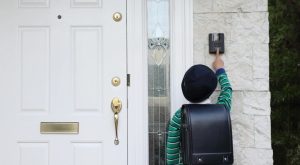
Video doorbells in the UK fall under multiple surveillance and data protection laws. If a homeowner’s system captures footage beyond their property, it must comply with the following regulations:
- General Data Protection Regulation (GDPR) – Governs how personal data, including video footage, is collected, stored, and shared.
- Data Protection Act 2018 – Aligns with GDPR and sets guidelines on handling recorded images and audio.
- Human Rights Act 1998 – Protects individuals’ rights to privacy, which may be affected if their images are captured without consent.
- Freedom of Information Act 2000 – Provides transparency on how data is handled by organisations, although this is more applicable to public bodies.
The Information Commissioner’s Office (ICO) is responsible for enforcing these laws. If a video doorbell records public areas or neighbouring properties without proper compliance, the homeowner could face serious consequences, including financial penalties or legal action.
How Can Your Video Doorbell Breach GDPR Rules?
Many homeowners assume that installing a video doorbell is a simple security measure, but if it captures footage beyond their private property, it falls under UK data protection laws, including the General Data Protection Regulation (GDPR) and the Data Protection Act 2018. These laws are designed to protect individuals’ privacy, and failing to comply with them can lead to serious consequences, including fines and legal action.
A video doorbell can breach GDPR rules in several ways:
1. Capturing Footage Beyond Your Property Boundaries
GDPR applies when video surveillance extends beyond your private property into public areas or neighbouring properties. This includes:
- Recording public spaces such as streets, pathways, or shared driveways.
- Capturing neighbours’ gardens, homes, or private areas without their consent.
- Filming communal areas in flats, apartments, or shared buildings where others have an expectation of privacy.
If your camera captures any of these areas, you are legally responsible for ensuring that the footage is handled in accordance with GDPR. This means informing people that they are being recorded and ensuring that their personal data (images, videos, or audio) is used lawfully.
2. Recording Individuals Without Their Knowledge or Consent
GDPR protects individuals’ rights regarding their personal data, which includes their image and voice. If your video doorbell records people without their knowledge, you could be breaching privacy laws.
You must:
- Inform visitors and neighbours that they are being recorded.
- Place clear signage near your property stating that CCTV is in operation.
- Ensure that video footage is only used for security purposes and not for surveillance of others.
Failing to do so can result in complaints, ICO investigations, and potential legal action.
3. Sharing Video Footage Without Permission
A common mistake homeowners make is sharing doorbell camera footage online, particularly on social media platforms. While it may seem harmless to post clips of suspicious activity, package thefts, or doorstep altercations, doing so can violate GDPR if the footage contains identifiable individuals who did not consent to being recorded.
Potential legal risks of sharing footage without permission include:
- Privacy complaints from individuals appearing in the footage.
- Legal claims for unauthorised use of personal data.
- ICO fines and enforcement actions for GDPR violations.
If you need to share footage for law enforcement purposes, you should provide it directly to the police rather than posting it publicly.
4. Storing Video Footage for Longer Than Necessary
GDPR requires that personal data must not be retained longer than necessary. If your doorbell camera stores recordings indefinitely or without a legitimate reason, you may be in breach of data protection laws.
To stay compliant:
- Set a retention policy for automatically deleting old footage after a reasonable period (e.g., 30-90 days).
- Delete footage upon request if it captures someone outside your property who does not want to be recorded.
- Avoid unnecessary storage of videos that are no longer needed for security purposes.
5. Recording Audio Without Justification
Many video doorbells come with an audio recording feature, which can create additional legal risks. Unlike CCTV footage, which may be justified for security reasons, recording private conversations without consent can be a serious violation of privacy laws.
To avoid breaching GDPR rules:
- Disable audio recording unless absolutely necessary.
- Use audio filters to minimise sound recording beyond your property.
- Inform visitors if their voices may be recorded.
Since audio recordings are considered more intrusive than video footage, they are subject to stricter legal scrutiny under GDPR.
6. Failing to Respond to a Data Subject Access Request (DSAR)
Under GDPR, individuals have the right to access, request, or delete their personal data if they have been recorded. This means that if a neighbour or visitor requests access to footage featuring them, or asks for it to be deleted, you are legally required to comply unless there is a valid reason to retain it (e.g., for a criminal investigation).
Ignoring or refusing a Data Subject Access Request (DSAR) could result in:
- Legal complaints filed with the ICO.
- Financial penalties for non-compliance.
- Enforcement actions requiring you to delete or modify the stored data.
If your doorbell records individuals outside your property, you should have a clear process in place for handling these requests.
What Are the Fines and Penalties for Non-Compliance?
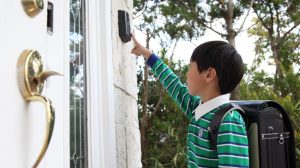
Failing to follow privacy regulations can lead to significant penalties. Homeowners found guilty of non-compliance with GDPR and ICO guidelines may face:
- Fines of up to £100,000 if their video doorbell captures footage outside their property boundaries without proper measures in place.
- Legal action from affected individuals, including compensation claims for breaches of privacy.
- ICO enforcement action, which can result in additional penalties, restrictions, or mandatory corrective measures.
- For businesses, fines of up to £17.5 million for violating GDPR rules when using video surveillance systems.
How Should You Store and Handle Video Footage?
Proper storage and management of video recordings are essential to ensure compliance with UK privacy laws. Homeowners should take the following precautions:
- Set the correct date and time on their system to maintain accurate records.
- Securely store video footage, ensuring only authorised individuals have access.
- Limit the retention period, keeping recordings only as long as necessary.
- Delete footage upon request, if the request is reasonable and in line with GDPR guidelines.
Failure to properly store or manage video recordings can result in penalties and legal disputes, especially if footage is misused or retained for an excessive period.
Can You Share Video Doorbell Footage on Social Media?
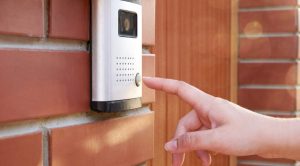
While it is common for homeowners to share video doorbell recordings online, especially if they capture suspicious behaviour or incidents like package theft, doing so can lead to legal consequences. Sharing footage on social media or with third parties may:
- Violate GDPR rules, especially if individuals appear in the footage without consent.
- Lead to privacy complaints from neighbours or passersby captured in the video.
- Result in legal claims if the footage is used inappropriately or damages someone’s reputation.
To avoid potential legal issues, homeowners should take extra precautions:
- Blur faces and identifiable details before sharing footage.
- Obtain consent from individuals appearing in the video.
- Only share footage when absolutely necessary, such as when reporting a crime.
What Are Your Responsibilities as a Video Doorbell Owner?
Owning a video doorbell comes with legal responsibilities. Homeowners must:
- Ensure their system is installed correctly to avoid capturing footage beyond their property.
- Use the device only for security purposes, rather than for monitoring others.
- Handle all recorded data responsibly, ensuring it is not shared or stored longer than necessary.
Ignoring these responsibilities can lead to disputes with neighbours, fines, and potential legal action.
What Steps Can You Take to Stay Compliant?
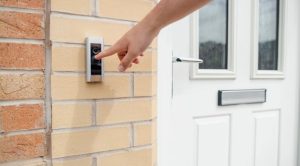
To avoid violating privacy laws, homeowners should follow these key steps:
- Inform neighbours about the presence of a video doorbell.
- Place visible signage near the doorbell to notify visitors that recording is in progress.
- Consider alternative security measures, such as better lighting, fences, or gates.
- Use privacy settings and filters to avoid recording unnecessary areas.
- Regularly review and delete stored footage to prevent unnecessary data retention.
By following these best practices, homeowners can ensure they remain compliant with UK surveillance laws while maintaining home security without infringing on others’ privacy.
FAQs About Video Doorbell
Can I be fined for having a video doorbell in the UK?
Yes, if your video doorbell records footage beyond your property boundaries without GDPR compliance, you could face fines of up to £100,000.
How do I make my Ring doorbell GDPR compliant?
Ensure that it only records within your property, inform visitors about recording, securely store footage, and delete recordings when no longer needed.
What should I do if my neighbour complains about my doorbell camera?
Discuss their concerns, adjust the camera angle to avoid recording their property, and comply with reasonable deletion requests if necessary.
How long can I legally store video doorbell footage?
There is no fixed limit, but footage should only be kept for as long as necessary. It is advisable to delete recordings after a few months if they are no longer needed.
Is it illegal to record audio on my video doorbell?
Recording audio can be a privacy concern, especially in shared spaces. Some legal experts recommend disabling audio recording unless absolutely necessary.
Can I take legal action if someone refuses to delete footage of me?
Yes, if footage was recorded unlawfully or shared without consent, you can file a complaint with the ICO or take legal action.
What happens if I don’t comply with ICO guidelines?
You could face legal action, fines, and even enforcement measures from the ICO to ensure compliance.



